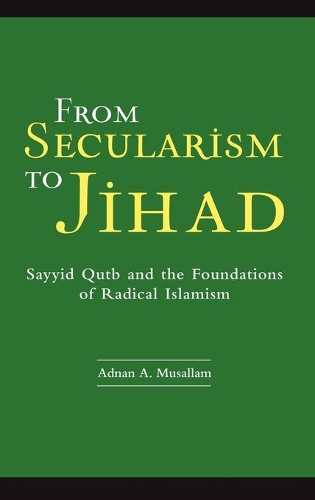
From Secularism to Jihad: Sayyid Qutb and the Foundations of Radical Islamism
(Hardback)
Publishing Details
From Secularism to Jihad: Sayyid Qutb and the Foundations of Radical Islamism
By (Author) Adnan Musallam
Bloomsbury Publishing PLC
Praeger Publishers Inc
30th October 2005
United States
Classifications
General
Non Fiction
Politics and government
Theology
297.272
Physical Properties
Hardback
280
Description
The modern political idea of jihada violent struggle against corrupt or anti-Islamic regimesis essentially the brainchild of one man who turned traditional Islamic precepts inside out and created the modern radical political Islamist movement. Using the evolution of Sayyid Qutb's life and writings, Musallam traces and analyzes Qutb's alienation and subsequent emergence as an independent Islamist within the context of his society and the problems that it faced. Radicalized following his stay in the United States in the late 1940s and during his imprisonment from 1954 to 1964, Qutb would pen controversial writings that would have a significant impact on young Islamists in Egypt for decades following his death and on global jihadist Islamists for the past quarter century. Since September 11, 2001, the West has dubbed Qutb the philosopher of Islamic terror and godfather ideologue of al-Qaeda. This is the first book to examine his life and thought in the wake of the events that ignited the War on Terrorism. A secular man of letters in the 1930s and 1940s, Qutb's outlook and focus on Quranic studies underwent drastic changes during World War II. The Quran became a refuge for his personal needs and for answers to the ills of his society. As a result, he forsook literature permanently for the Islamic cause and way of life. His stay in the United States from 1948 to 1950 reinforced his deeply held belief that Islam is man's only salvation from the abyss of Godless materialism he believed to be manifest in both capitalism and communism. Qutb's active opposition to the secular policies of Egyptian President Nasser led to his imprisonment from 1954 to 1964, during which his writings called for the overthrow of Jahili (pagan) governments and their replacement with a true and just Islamic society. A later arrest and trial resulted in his execution in August 1966.
Reviews
This significant, welcome study of a key Islamist who was the architect of radical Islam ideology and paid the ultimate price for it under the reign of Egypt's secularist nationalist 'Abd al-Nasir focuses on the sequence of events in Qutb's intellectual career, stressing the transformations in his views of life as he evolved from a literary critic to an Islamic propagator. Musallam's analysis describes and interprets Qutb's published works, which deal with politics, literature, religion, and society from 1919 to 1952, when the Nasserist revolution took place. Qutb's early childhood and his career as poet and critic precede an account of his emergence as a student of the Qur'an, and his alienation when the Muslim Brotherhood, whose philosophical architect he had served, drove him to seek social justice. His experiences and impressions in America 1948-1950 served to harden his views. He emerged as a radical Islamist from 1952 until his 1964 execution. Qutb's martyrdom and posthumous impact contributed to the global jihad led by Islamist disciples such as Egyptians Muhammad Atta, who led the assault on the Twin Towers, and Ayman al-Zawahiri, the deputy of Bin Laden. This well-organized, easy to follow work describes how a secular intellectual was transformed into a fundamentalist Islamist. Recommended. Most levels/libraries. * Choice *
Adnan Musallam's careful account is compelling. * Journal of Islamic Studies *
Adnan Musallam has written a masterful and lucid biography in From Secularism to Jihad: Sayyid Qutb and the Foundations of Radical Islamism, the only biography of Qutb in English.Musallam shows a side of Qutb, prior to becoming an Islamist, that is rarely seen.The importance of this biography is that Musallam shows that even a fairly secular writer like Qutb can become a jihadist.Musallam also details Qutb's influence on contemporary militants. * Terrorism and Political Violence *
Musallam has produced a standard historical biography that clearly traces the evolution of Qutb's ideas over the course of his life. * Middle East Journal *
Author Bio
Adnan A. Musallam is an Associate Professor in History, Politics, and Cultural Studies at Bethlehem University. Active in interfaith dialogue, he has published books and articles in both Arabic and English.
